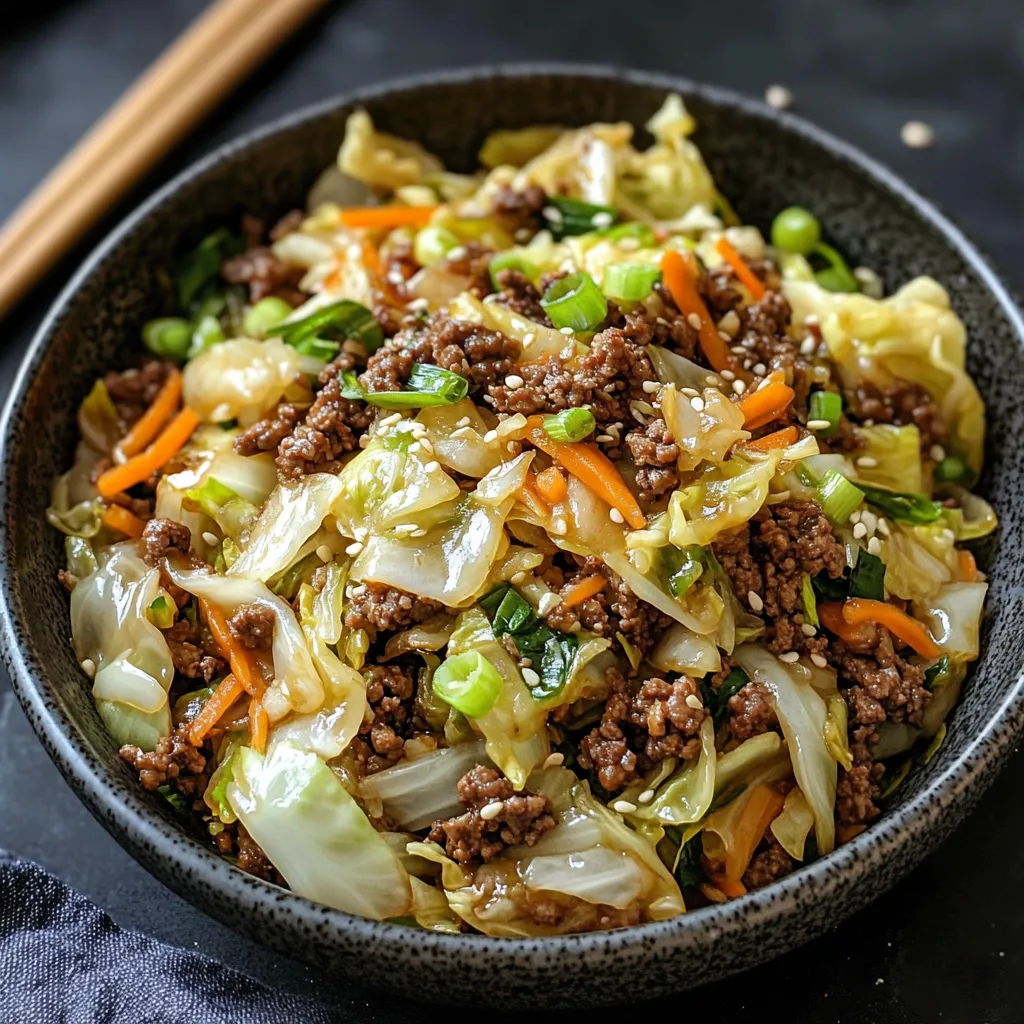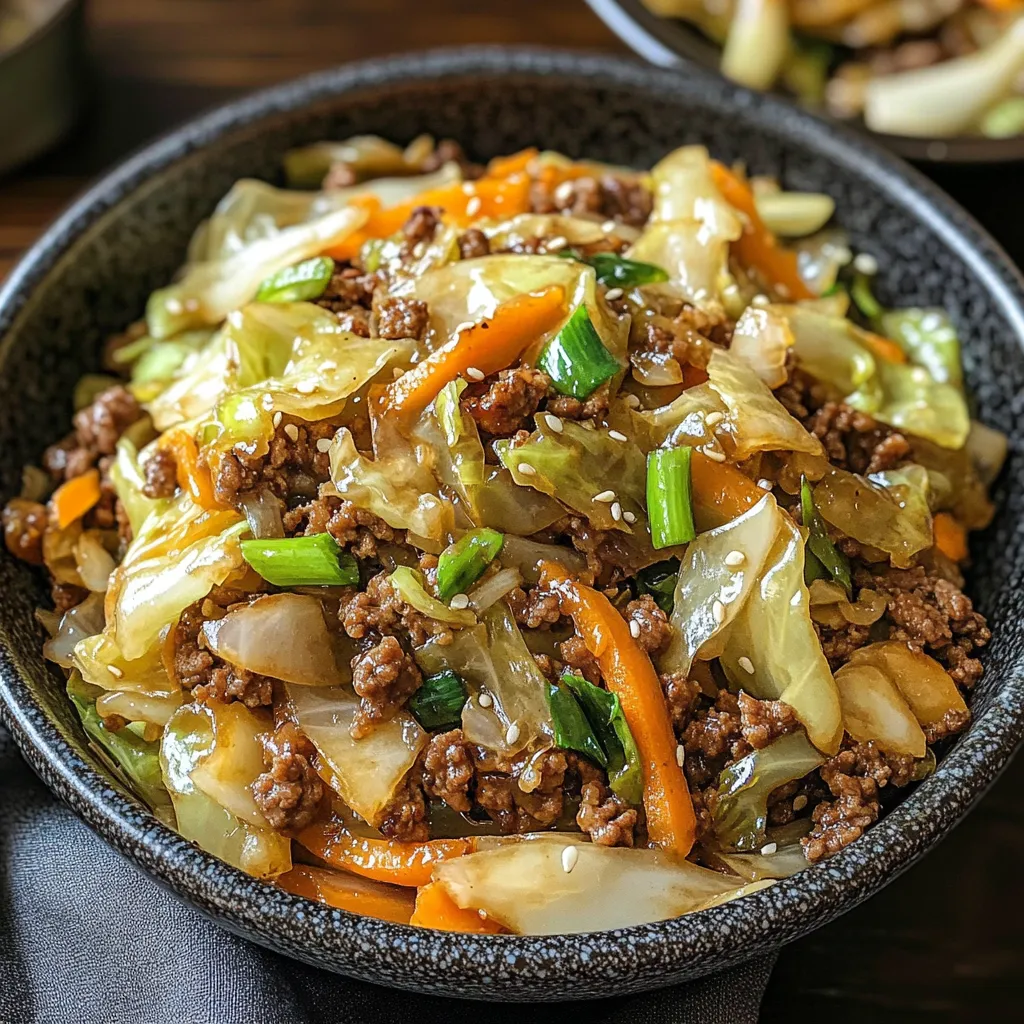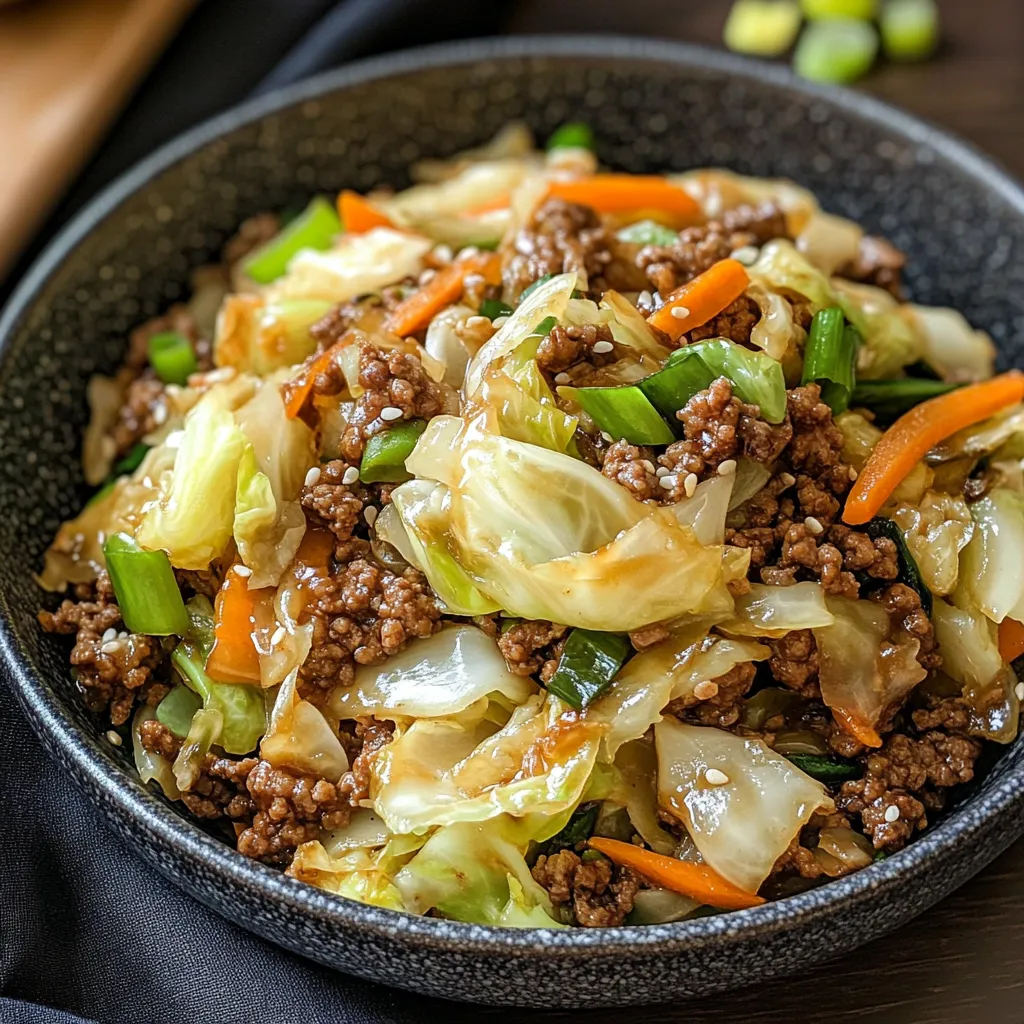 Save
Save
Savory beef crumbles caramelize alongside emerald cabbage ribbons in a glossy sauce that achieves culinary alchemy in mere minutes. This Chinese Ground Beef and Cabbage Stir Fry transforms humble ingredients into an extraordinary dining experience through the strategic layering of complementary textures and flavors. Each forkful delivers the perfect harmony of tender protein and crisp-tender vegetables—enrobed in a sauce that balances umami depth with subtle aromatics, creating a dish that satisfies deeply while remaining refreshingly light.
I discovered this brilliant combination during a particularly resourceful kitchen moment when faced with minimal ingredients but maximum hunger. The first time I served this improvised creation, my family fell uncharacteristically silent—the highest form of culinary praise in our typically talkative household. My teenage daughter, ordinarily dismissive of cabbage in any form, asked for seconds and inquired when we might have it again. What began as practical necessity has evolved into our most-requested weeknight meal, proving that sometimes the most memorable dishes emerge from the simplest foundations.
Flavor Foundations
- Ground beef: Provides rich, savory base; 85/15 lean-to-fat ratio offers optimal flavor balance
- Cabbage: Green varieties maintain brightness and texture; savoy adds delicate visual interest
- Shiitake mushrooms: Dried varieties reconstituted offer concentrated umami; fresh provide meaty texture
- Green onions: Both white and green parts serve different purposes; slice on diagonal for visual appeal
- Garlic: Fresh cloves deliver aromatic foundation; proper mincing ensures even distribution
- Ginger: Fresh root adds distinctive warmth and brightness; microplane-grated ensures no fibrous bits
- Soy sauce: Light varieties offer clean flavor; dark varieties contribute deeper color and richness
- Oyster sauce: Creates unmatched savory depth; vegetarian versions available using mushroom base
- Sesame oil: Added at finish preserves aromatic qualities; toasted varieties significantly enhance flavor
- Vegetable oil: Neutral flavor allows other ingredients to shine; high smoke point prevents burning
- Rice: Long-grain varieties maintain distinct texture; jasmine adds aromatic dimension
Culinary Creation
- Precise Preparation
- Begin by preparing all ingredients before heating your wok or skillet—this essential 'mise en place' ensures the rapid cooking proceeds without interruption. Slice cabbage into uniform ribbons approximately ¼-inch wide, creating pieces that will cook evenly while maintaining structural integrity. Clean mushrooms with a damp cloth rather than washing, preserving their earthy intensity, then slice thinly. Separate green onions into white and green portions, mincing whites finely for cooking and slicing greens on a dramatic diagonal for garnish. Mince garlic and ginger just before cooking to preserve their volatile aromatic compounds, keeping them separate as they'll enter the wok at different moments.
- Foundation Building
- Heat your wok or large skillet over medium-high heat until a drop of water instantly evaporates—this critical temperature creates proper searing rather than steaming. Add vegetable oil, swirling to coat the cooking surface, then immediately introduce minced garlic and ginger, stirring constantly for thirty seconds until fragrant but not browned, which would introduce bitterness. This brief aromatic blooming infuses the oil with essential flavor compounds that will permeate every element of the finished dish. The exact timing here matters tremendously—too short and the aromatics remain raw; too long and they become bitter.
- Protein Development
- Add ground beef directly to the aromatic-infused oil, breaking it into small, consistent crumbles with a wooden spoon or spatula. Allow it to cook undisturbed for a moment before stirring, enabling proper browning that creates essential flavor through Maillard reactions. This patient approach prevents the meat from steaming in its own juices, instead developing the rich, caramelized notes that distinguish exceptional stir-fries from mediocre ones. Continue cooking until the beef has lost all pink coloration and begun developing golden-brown edges that indicate proper caramelization and flavor development.
- Textural Integration
- Introduce sliced mushrooms to the browned beef, tossing together for several minutes until they release their moisture and begin to concentrate in flavor. Their natural glutamates enhance the beef's savory qualities while contributing contrasting texture. Next, add cabbage ribbons, tossing frequently to coat with oil and existing flavors. The cabbage will gradually soften while maintaining a pleasant crispness, providing textural counterpoint to the tender beef and creating volume that makes this dish particularly satisfying despite its relative simplicity. Continue cooking until cabbage is wilted but still maintains structural integrity.
- Flavor Amalgamation
- Create harmony by adding liquid seasonings—soy sauce, optional oyster sauce, and sesame oil—directly to the hot mixture, allowing them to sizzle and reduce slightly while coating every ingredient. This technique, rather than premixing sauces, allows each element to maintain its distinct character while still creating a cohesive whole. The soy sauce provides salinity and umami, oyster sauce contributes complex savory notes, and sesame oil adds aromatic nuttiness. Allow these liquid seasonings to reduce slightly, concentrating their flavors while creating a light sauce that glosses each component rather than drowning them.
- Finishing Flourish
- Remove the wok from heat before incorporating the reserved green onion tops, preserving their fresh flavor and vivid color. Toss gently to distribute throughout the mixture, creating visual interest and brightness that balances the deeper flavors developed during cooking. This thoughtful final addition provides aromatic freshness that lifts the entire dish, preventing the richness from becoming overwhelming. Allow the mixture to rest momentarily before serving, giving flavors a chance to settle and meld together into perfect harmony.
 Save
Save
My neighbor initially expressed doubt when I mentioned how quickly this satisfying meal comes together. The first time she watched me prepare it, she remarked with genuine surprise, 'I can't believe something this flavorful doesn't require hours of cooking!' Her reaction confirmed what I'd discovered myself—that Chinese cooking techniques, when properly understood, create remarkable results through attention to process rather than complexity of ingredients. When she noted the perfect texture of the cabbage, I shared my secret: introducing it at precisely the right moment and cooking just until wilted but still vibrant, a simple technique difference that transforms good into extraordinary.
Creative Variations
Transform this adaptable dish to accommodate various preferences while maintaining its essential character. Substitute ground chicken or turkey for a lighter option, adjusting cooking time accordingly to prevent dryness. Create a vegetarian version using crumbled tofu or tempeh, perhaps adding a dash of miso for enhanced umami depth. For spice enthusiasts, incorporate fresh chilies or a drizzle of chili oil just before serving. Those seeking additional vegetables might add julienned carrots, snow peas, or water chestnuts for nutritional diversity and textural contrast. Consider regional variations like adding Sichuan peppercorns for numbing heat or black beans for Cantonese-inspired flavor.
Serving Suggestions
This versatile dish welcomes thoughtful presentation that enhances its appeal. Serve over steamed jasmine rice in a shallow bowl that showcases the colorful ingredients while capturing every drop of the savory sauce. For lower-carb alternatives, consider offering cauliflower rice or serving wrapped in crisp lettuce leaves for refreshing contrast. Provide additional garnishes tableside, such as toasted sesame seeds, crispy fried shallots, or fresh cilantro to allow personalization. For a complete meal, accompany with simple steamed greens dressed only with a light drizzle of soy sauce and sesame oil, maintaining the clear flavors that distinguish authentic Chinese home cooking.
Practical Preservation
Store leftovers properly to maintain quality for continued enjoyment. Allow the dish to cool completely before transferring to glass containers rather than plastic, which can absorb strong flavors. Refrigerate for up to four days, knowing the flavors often continue developing overnight as ingredients further meld together. Reheat gently in a hot wok or skillet rather than microwave, adding a small splash of water if needed to revitalize the sauce without overcooking the cabbage. This dish maintains its quality remarkably well during storage, often tasting even better the second day as flavors continue to harmonize.
 Save
Save
The first time I created this Chinese Ground Beef and Cabbage Stir Fry, I was simply seeking a practical way to transform everyday ingredients into something more interesting than their individual potential might suggest. What I discovered was a dish that delivers more satisfaction with less effort than many of my more complex recipes. Each time I make it, I'm reminded that cooking at its best is about transformation—how heat and technique elevate simple ingredients, how thoughtful sequencing builds layers of flavor, and how respecting the inherent qualities of each component creates something that delights all senses while remaining accessible enough for even the busiest weeknight.
Common Questions About Cooking
- → Can I substitute the ground beef with something else?
- Yes, this recipe works well with several protein substitutes. Ground turkey or chicken makes a leaner option with a milder flavor. For a plant-based version, try crumbled tofu or tempeh - just add an extra tablespoon of soy sauce for flavor. Ground pork is also excellent and adds a slightly richer taste. The cooking technique remains the same regardless of which protein you choose.
- → What can I use instead of oyster sauce?
- If you don't have oyster sauce or prefer not to use it, there are several alternatives. Hoisin sauce makes a good substitute, though it's sweeter. You can also use an additional tablespoon of soy sauce mixed with a half teaspoon of sugar. Fish sauce works for a different but equally savory flavor (use less as it's stronger). For vegetarian options, look for mushroom-based vegetarian oyster sauce or try a tablespoon of miso paste mixed with a teaspoon of water.
- → How can I make this dish low-carb?
- This dish is already relatively low in carbohydrates without the rice. To enjoy it as a complete low-carb meal, serve it on its own or with cauliflower rice instead of regular rice. You can also increase the cabbage amount for more volume without adding significant carbs. Another option is to serve it in lettuce cups - butter lettuce or iceberg lettuce leaves make perfect wraps for the beef and cabbage mixture.
- → What other vegetables can I add to this stir fry?
- This stir fry is very versatile and works well with many vegetables. Great additions include thinly sliced bell peppers, carrots (julienned or shredded), bean sprouts, snow peas, or bok choy. You can also add water chestnuts or bamboo shoots for extra crunch. If using denser vegetables like broccoli or carrots, add them before the cabbage to give them more cooking time, or briefly blanch them beforehand.
- → How spicy is this dish, and how can I adjust the heat level?
- As written, this recipe is mild and family-friendly. To add heat, try incorporating one or more of these options: add 1-2 teaspoons of sriracha or chili garlic sauce when you add the soy sauce; include 1-2 dried chilies or 1/2-1 teaspoon of red pepper flakes when sautéing the garlic and ginger; or finish the dish with a drizzle of chili oil. For a milder flavor enhancement without much heat, add 1/2 teaspoon of white pepper instead of black pepper.
- → Can I prepare any elements of this dish ahead of time?
- Yes, this dish works well for meal prep and components can be prepared in advance. You can slice all the vegetables and store them in the refrigerator for 1-2 days before cooking. You can also cook the entire dish and refrigerate it for up to 4 days - it reheats well in a skillet or microwave. For best results when reheating, add a splash of water or broth to prevent drying out, and consider adding fresh green onions after reheating for brightness.
